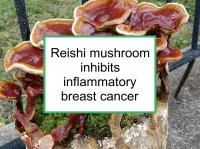A new study has reported that reishi mushroom (Ganoderma lucidum) reduces inflammatory breast cancer (IBC) cell growth and viability without harming normal breast cells. The study was designed to investigate the impact of reishi mushroom on SUM-149 inflammatory breast cancer cell viability, apoptosis, and invasion.
Inflammatory breast cancer is a poorly understood form of aggressive breast cancer. The absence of a palpable tumor mass and the propensity of IBC to invade the lymphatic system contributes to its lethality. Unlike when other types of breast cancer cells become metastatic, IBC cells invade by forming tumor spheroids. Reishi mushroom contains biologically active compounds that have been shown to be cytotoxic against cancer cells.
In the study, reishi was found to selectively inhibit IBC cancer cell viability without affecting the viability of noncancerous breast cells. Reishi was also found to reduce cell invasion and to disrupt the cell spheroids that are characteristic of invasive IBC. Reishi was found to act by causing reductions in the expression of key genes involved in cancer cell survival, proliferation, invasion, and metastasis. The authors conclude that the study findings suggest that reishi is an effective anti-IBC treatment.
Please see our article on what to eat if you have inflammatory breast cancer for more information.
